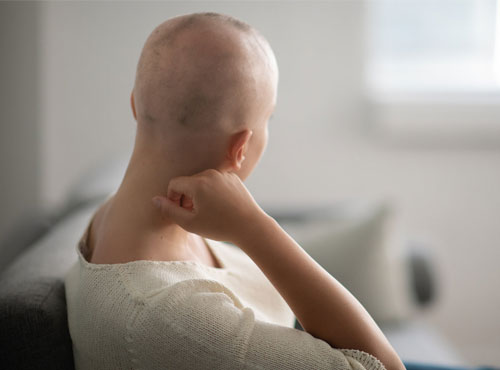Ayurveda for Cancer Treatment
Ayurvedic Remedies, Therapies, and Advice for All Your Health Issues, Recommended by Expert Health Professionals
WHAT IS CANCER?

Cancer is a condition in which the body’s cells grow uncontrollably and spread to the other parts of the body. As the body is made up of trillions of cells, new cells are formed, and the old ones diet out. But many a time, the process wears out and allows the production of abnormal or unhealthy cells. These are called to be tumors, which are lumps of tissue in the body. However, they can be cancerous or noncancerous.
Most cancerous cells have the tendency to invade other organs in the body and affect their functioning.
How does cancer grow?
Our body is made up of cells broken into tissues and organs. Each cell encapsulates the nucleus, which has DNAs that instructs the cells on what to do- to grow, divide, and die. The cells follow the instructions and grow as the process continues and we live healthily. But, if there is any damage to the cells or DNA or genetic mutation, the instructions in the DNA mix up and allow cells to divide abnormally, leading to cancer.
Types of Cancers
Depending on the part of the body affected, there are more than 200 types of cancer. Not every cancer is life-threatening; some of them are quite prevalent, while others being less common.
Different forms of cancer are classified according to the type of cell they grow in. There are five main groups, including:
Carcinoma – This type of cancer grows in the skin or in tissues, covering the internal organ.
Sarcoma – The connective or supportive tissues are the places where the cancer cells begin in the first place. The effective organs include fat, muscle, bone, cartilage, and blood vessels.
Lymphoma and myeloma – Such types of cancers begin in the cells of the immune system.
Leukaemia – A form of cancer that begins in the white blood cells made in the bone marrow.
Lymphoma and myeloma – Primarily, the cells of the immune system are the main spot for cancer growth.
Brain and spinal cord cancers – It is cancer in the central nervous system cancer affecting the brain and spinal cord.
Symptoms
The signs and symptoms of cancer vary depending upon the organ that has a tumor. There are generalized indications associated, but not specific to, cancer, including:
- Fatigue and unexplainable drowsiness
- A lump or muscular growth under the skin in the area where the tumor is growing
- Changes in the weight for no apparent reason
- Irregular bladder or bowel movements
- Persistent cough
- Discoloration of the skin, such as yellowing or redness of the skin
- Changes to existing moles
- Reduced healing capacity of the skin
- Indigestion
- Pain in the muscles
- Unexplained fevers or night sweats
- Bleeding or bruising
- Difficulty swallowing
- Hoarseness
When to see a doctor
It is important to consult a doctor if you experience signs linked to cancer, as mentioned above. For those with a family history of cancer, annual testing is administered to help with the early detection of any tumor. There are tests your doctor would do to estimate the risk of cancer in you.
Causes
Doctors believe the development of cancer to be a result of genetic mutations in the cells. The genetic mutations result in the abnormal growth of cells in any subsequent organ. Yet, the cause of the genetic mutation is not known as of now.
Risk factors
Some factors are bound to elevate the risk of cancer in many, but not necessarily everyone with those factors is likely to get cancer symptoms.
Factors that surge the risk of cancer include:
- Being elderly
- Leading a sedentary lifestyle
- A family history of cancer
- Certain medical conditions
- Environmental factors like exposure to chemicals or irritants as released by smoking.
Ayurvedic treatment for cancer
Charaka Samhita and Sushruta Samhita (700 BC) described cancer as Granthi and Abruda. Both can be inflammatory and non-inflammatory conditions of Vata and Kapha origin. Aggravated Vata and Kapha results in the division and abnormal growth of cells. The noncancerous tumor results from predominant Kapha appearance in the body, while malign cancers are the outcome of Pitta dominance in the body. In this condition, digestive fire, called Agni, is increased and so becomes harmful for the tissues around.
In Ayurveda, the restoration of health is based on rejuvenation of the cells and tissues to promote a healthy balance between mind and body. Equal emphasis is laid on emotional temperaments in the wake of the disease. So, ayurvedic texts are not confined to mental and physical beings but emotional as well.
The principle aim of therapies as employed by Ayurveda is to detoxify and rejuvenate the body to activate the body’s self-healing capacity, balance the doshas or life energies, and remove Ama or toxins from the body.
Panch Karma is one of those effective ayurvedic therapies to calm the doshas and nourish dhatus. The therapy is unique in the sense that it involves preventive and curative measures for chronic conditions like cancer. The ayurvedic treatment can be initiated as a complementary approach at any stage and yields maximum results as a co-therapy, both for the mind and the body. Ostensibly, ayurvedic methodologies are also helpful in the elimination of downsides of therapies and surgical interventions for cancer.
Approved by

Certificate no- AH-2022-0145
FEB 23,2022 - FEB 22,2025
